
DESY, short for Deutsches Elektronen-Synchrotron, is a national research centre for fundamental science located in Hamburg and Zeuthen near Berlin in Germany. It operates particle accelerators used to investigate the structure, dynamics and function of matter, and conducts a broad spectrum of interdisciplinary scientific research in four main areas: particle and high energy physics; photon science; astroparticle physics; and the development, construction and operation of particle accelerators. Its name refers to its first project, an electron synchrotron. DESY is publicly financed by the Federal Republic of Germany and the Federal States of Hamburg and Brandenburg and is a member of the Helmholtz Association.

The Korea Aerospace Research Institute (KARI), established in 1989, is the aeronautics and space agency of South Korea. Its main laboratories are located in Daejeon, in the Daedeok Science Town. KARI's vision is to continue building upon indigenous launch capabilities, strengthen national safety and public service, industrialize satellite information and applications technology, explore the Moon, and develop environmentally-friendly and highly-efficient cutting-edge aircraft and core aerospace technology. Current projects include the KSLV-2 launcher. Past projects include the 1999 Arirang-1 satellite. The agency was founded in 1989. Prior to South Korea's entry into the Institute for Advanced Engineering (IAE) in 1992, it focused primarily on aerospace technology.

Korea Research Institute of Chemical Technology (KRICT) is the national chemical research institute for the Republic of Korea and was established in 1976. KRICT is a member of the National Research Council of Science & Technology.
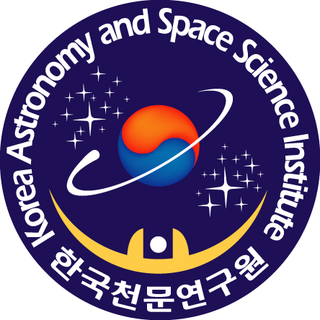
The Korea Astronomy and Space Science Institute (KASI) is the national research institute in astronomy and space science of South Korea funded by the South Korean Government. Its headquarters are located in Daejeon, in the Daedeok Science Town. Research at KASI covers main areas of modern astronomy, including Optical Astronomy, Radio Astronomy, Space Science, and Theoretical Astronomy.

Noh Tae-won is a South Korean physicist and director of the Center for Correlated Electron Systems (CCES) in the Institute for Basic Science (IBS) at Seoul National University (SNU). He has published more 400 papers and been cited 15,000 times. He is a member of the Materials Research Society, Korean Optical Society, Korean Crystallographic Society, and Association of Asia Pacific Physical Societies and been on several editorial boards for journals. In 2017, he became president of the Korean Dielectrics Society.

Cheon Jinwoo is the H.G. Underwood Professor at Yonsei University and the Director of the Center for Nanomedicine, Institute for Basic Science (IBS). As a leading chemist in inorganic materials chemistry and nanomedicine Cheon and his group research chemical principles for the preparation of complex inorganic materials. He has been a Clarivate Analytics Highly Cited Researcher both in the field of chemistry in 2014, 2015, 2016 and cross-field in 2018. He is a fellow of the American Chemical Society, Royal Society of Chemistry, and Korean Academy of Science and Technology, a senior editor of Accounts of Chemical Research and an editorial advisory board member of Journal of Materials Chemistry, Nano Letters and Materials Horizons.

Nam Chang-hee is a South Korean plasma physicist. Nam is specializing in the exploration of relativistic laser-matter interactions using femtosecond PW lasers. Currently he is professor of physics at Gwangju Institute of Science and Technology and director of the Center for Relativistic Laser Science as a part of the Institute for Basic Science (IBS).
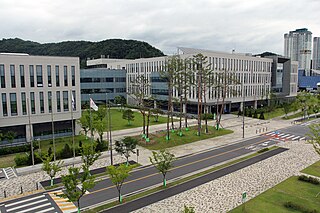
The Institute for Basic Science is a Korean government-funded research institute that conducts basic science research and relevant pure basic research. Comprising approximately 30 research centers with more than 60 research groups across the nation and a headquarters in Daejeon, IBS has approximately 1,800 researchers and doctoral course students. Around 30% of the researchers are from countries outside of South Korea. The organization is under the Ministry of Science and ICT.

Koh Gou Young is a researcher from South Korea studying organ vasculature and lymphatic vessels with an interest in angiogenesis, lymphangiogenesis, adipogenesis, and cardiogenesis. His research has contributed to the publication of more than 200 journal articles, including multiple publications on how Tie2 deficits are related to sepsis, blood-retinal barrier damage, and an imbalance of intraocular pressure in Schlemm's canal which induces glaucoma.

Oh Se-jung is a South Korean politician and physicist. He has served as the director of the Korean Federation of Science and Technology Societies, the first president of the Institute for Basic Science, and the 27th president of Seoul National University.
Kim Jong-hoe is a South Korean educator and politician. He is the incumbent Member of the National Assembly for Gimje-Buan, as well as the Secretary-General of the New Alternatives.
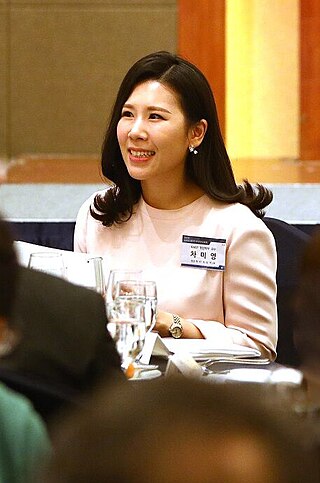
Cha Meeyoung, sometimes known as Mia, is an associate professor at KAIST in the School of Computing and a chief investigator in the Pioneer Research Center for Mathematical and Computational Sciences at the Institute for Basic Science. Her research focuses on network and data science with an emphasis on modeling, analyzing complex information propagation processes, machine learning-based computational social science, and deep learning. In June 2024, she will become the scientific director of the Max Planck Institute for Security and Privacy. She has served on the editorial boards of the journals PeerJ and ACM Transactions on Social Computing.
Kuk Young is a South Korean physicist, former physics professor and vice-provost of research of Seoul National University, distinguished professor of Ewha Womans University, and chairman of the Samsung Science and Technology Foundation. He is a fellow of the American Physical Society, Korean Academy of Science and Technology, Institute of Physics, Korean Physical Society, and Korean Vacuum Society. He has performed editor roles for the journals Nanotechnology, ACS Nano, and Solid State Electronics and is the fourth president of Daegu Gyeongbuk Institute of Science and Technology (DGIST).

Choi Kiwoon is a theoretical particle physicist researching focusing on particle theory and cosmology. He was a research professor at Chonbuk National University and a full professor at KAIST. He is the founding director of the Institute for Basic Science Center for Theoretical Physics of the Universe. He is a member of the Korean Academy of Science and Technology.

Kim Doochul is a South Korean theoretical physicist. He was head of the Department of Physics, director of the BK21 Physics Research Division, and professor emeritus at Seoul National University. He was also a fellow and chairperson in the Korean Academy of Science and Technology before becoming the fifth president of Korea Institute for Advanced Study and the second president of Institute for Basic Science. He was a standing trustee with the Asia Pacific Center for Theoretical Physics and a board of Trustee member of the Korean Physical Society.

Changjoon Justin Lee is an American neuroscientist specializing in the field of glioscience. He served as the Director of Center for Neuroscience at the Korea Institute of Science and Technology and later founded the WCI Center for Functional Connectomics as part of the World Class Institute Program. In 2015, he established the Center for Glia-Neuron Interaction before becoming co-director of the IBS Center for Cognition and Sociality and head of the Cognitive Glioscience Group in 2018. He has been on the editorial boards of the journals Molecular Brain and Molecular Pain and is a chief editor of Experimental Neurobiology.
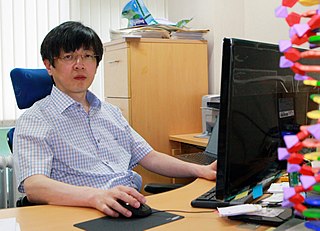
Kim Jin-Soo is a chemist, biologist, and entrepreneur. He was CEO and CSO, ToolGen, Inc., is a professor in the Department of Chemistry of Seoul National University and director of the Center for Genome Engineering. His research team has developed and improved several types of programmable nucleases, specifically zinc finger nucleases (ZFNs), TAL effector nucleases (TALENs), and RNA-guided engineered nucleases (RGENs). In 2018, he was a Clarivate Analytics Highly Cited Researcher in the cross-field category and in the biology and biochemistry category in 2019.

Oum Sang-il is a Korean mathematician working in graph theory and discrete mathematics. He is a tenured professor in the Department of Mathematical Sciences at KAIST and the chief investigator of the Discrete Mathematics Group in the Pioneer Research Center for Mathematical and Computational Sciences at the Institute for Basic Science. He is known for his work on structural graph theory and in particular for structures and algorithms relating to rank-width, clique-width, and branch-width. He published more than 45 journal papers.
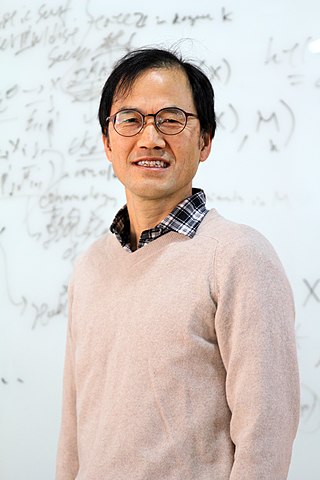
Oh Yong-Geun is a mathematician and distinguished professor at the Pohang University of Science and Technology and founding director of the IBS Center for Geometry and Physics located on that campus. His fields of study have been on symplectic topology, Floer homology, Hamiltonian mechanics, and mirror symmetry He was in the inaugural class of fellows of the American Mathematical Society and has been a member of Institute for Advanced Study, Korean Mathematical Society, and National Academy of Sciences of the Republic of Korea and is on the editorial boards of Journal of Gokova Geometry and Topology and Journal of Mathematics of Kyoto University.
National Scientist of the Republic of Korea was an award bestowed between 2005 and 2012. The prize was established by the Ministry of Education, Science and Technology to achieve the world's best research results by providing research funds of 1.5 billion KRW per year to a total of 10 scientists. Research prize funding ended when their affiliation changed. Envisioned as the highest scientific award of the nation, it was initially presented to Hwang Woo-suk in 2005 under the name Top Scientist (최고과학자) with an annual funding prize of 3 billion KRW given over three years. Due to his scandal, the award was withdrawn from Hwang, the name of the prize was changed and the research funding was reduced. The reformed award was given in 2006, 2007, 2010 and last bestowed in 2012. The end of the award coincided with the founding of the Institute for Basic Science with five laureates changing their affiliation to the new institute.

















